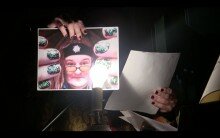
CAConrad grew up in Pennsylvania, where he helped to support his single mother during his difficult youth. Influenced by Eileen Myles, Audre Lorde, Alice Notley, and Emily Dickinson, Conrad writes poems in which stark images of sex, violence, and defiance build a bridge between fable and confession. He is well known for his (Soma)tic poetry rituals, which he has described as, “how I live in my awareness.”
Ultimately, I want my (Soma)tic poetry and poetics to help us realize at least two things. That everything around us has a creative viability with the potential to spur new thinking and imaginative output and that the most necessary ingredient to bringing the sustainable, humane changes we need and want for our world requires creativity in all lives, every single day.
Conrad’s newest book, Ecodeviance: (Soma)tics for the Future Wilderness, was described by The Boston Review as a, “subversive syllabus for a queer ecopoetics, a set of twenty-three . . . exercises, all at once, in magic, telepathy, transgression, confrontation, fantasy, wish-fulfillment, interspecies communication, self-healing, and writing.”
Conrad’s poems and (Soma)tic rituals are often overtly political in nature. “Mine is a poetics of uncooperation for all the brutal strategies built to sustain capital gain,” Conrad said in an interview at The Academy of American Poets, insisting on the need to make, “national tragedies personal.”
a happier location for
the war not the
easiest thing you realize
beautiful architecture
refreshing beverages
our signs read hello love us for
the century of
progress we
gave you
bombers
arriving
early here
they are
– from ‘coping skills lost in the flood’
In a 2010 review of The Book of Frank for Jacket Magazine, Eileen Myles observed that, “in Conrad’s world the parameters are deliberately unknowable because that is the nature of our time. In piecing together, configuring and releasing his extreme miniatures – agonized fables, poems about America. CAConrad includes us all in the enormous outside of his heart. Which is the world in all its possibility.”
years of practice for a soft
landing in the slaughter
we looked far off to
a flag sewn into flesh
dear enemy come down the
hill I have taken a title out
of the love for you jumping
down the clear shaft of your eye
you would not know how long I
paused when writing this unless
I said so in the poem
– from ‘Lonely Deep Affection’
Transformation is at the core of Conrad’s work, whether it is political or personal in nature. Speaking about the autobiographical elements of The Book of Frank, Conrad said, “My work is not about wallowing in posttraumatic stress disorder, it’s about posttraumatic stress growth.”
punch wall of forest for
an oaken
desk
another dream we
needed agitating the
sentence as it rows across a
newly destroyed heart folding
following tormenting one another
– from ‘Reading Starlight with One Eye like Creeley’
CAConrad is the author of seven books and conducts workshops on (Soma)tic Poetry and Ecopoetics. He was a 2015 Headlands Art Fellow, and has received fellowships from Lannan Foundation, MacDowell Colony, Banff, Ucross, RADAR, and the Pew Center for Arts & Heritage. The Book of Conrad, a documentary about his life and work, was released in 2016.
Bibliography
Circle M, Counterpath Press, Denver, Colorado, 2016
Ecodeviance: (Soma)tics for the Future Wilderness, Wave Books, Seattle, 2014
A Beautiful Marsupial Afternoon: New (Soma)tics, Wave Books, Seattle, 2012
The Book of Frank, Wave Books, Seattle, 2010
The City Real & Imagined, Factory School, Queens, New York, 2010
Links
POETRY magazine podcast for October 2013, PoetryFoundation.org.
CAConrad reads ‘Reading Starlight with One Eye like Creeley,’, PoetryFoundation.org.
CAConrad reads ‘Slaves of Hope Live Only for Tomorrow’, PoetryNow.
‘Confessional Poetry Off the Shelf: CAConrad talks about Anne Sexton’s landscapes of grief’, PoetryFoundation.org.
CAConrad reads, ‘Lonely Deep Affection’ PoetryFoundation.org.
‘No Spell Broken: A Discussion of CAConrad’s (Soma)tic Midge’, Poem Talk.
‘You’ve Come a Long Way, Baby, CAConrad interviewed by Eileen Myles, PoetryFoundation.org.
Blog posts by CAConrad, PoetryFoundation.org.
An interview with CAConrad, the Library of Congress’s least favorite poet, Melville House.
Boston Review microreview
(Soma)tic Poetics: An Interview with CAConrad by Thom Donovan, Academy of American Poets.
3 (Soma)tic Poetry Rituals & Resulting Poems by CAConrad, Headlands.org.

